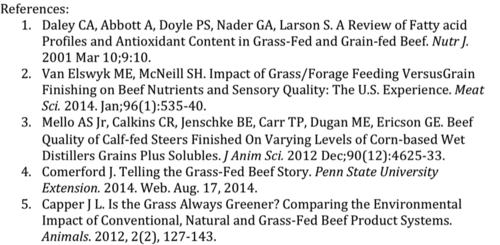Sage is here to help.
Feel like you could be eating better? Not sure what to change or where to look? Sage Nutritious Solutions make it easy for you to discover the wide, wonderful world of balanced, healthy, bangin' food.
Is Grass-Fed Beef Really Better?
A lot of people believe grass-fed beef is better tasting meat, nutritionally superior, and more environmentally friendly than commercial corn/grain-fed beef. It certainly costs more than your typical commercial beef, but before you shell out the extra dollars - how honest are these said benefits of consuming grass-fed versus grain-fed beef? Whether you are debating between restaurants to satisfy your cheeseburger craving or at the grocery store shopping for meat for taco night - we investigated the differences between grass-fed beef and the standard corn/grain-fed beef in order to help you make that decision.
Which tastes better?
Taste always boils down to an individual preference, and this is no different when faced with grass-fed versus grain-fed beef. The observational differences between the two are clear. With grass-fed beef you are getting leaner meat. Fat and marbling will change how meat cooks and tastes. "Mouth feel" is a concept used to describe the sensation that foods and drinks create in the mouth. Foods that contain a higher fat content will enhance "mouth feel" and this tends to increase the enjoyment of eating. Some people prefer the heartier fat content and juicier flavor of regular beef while some people prefer the distinct and unmistakably grassy flavor that accompanies grain-fed beef.
Which is better for you nutritionally?
Grass-fed beef seems to be the winner for containing more nutritional benefits in comparison to commerical beef. Grass-fed beef has been found to have slightly higher antioxidant content versus grain-fed beef. Antioxidants are a hot topic in nutrition and health because of their ability to quench free radicals (pollutants) that can otherwise cause damage to our cells. In addition to grass-fed beef having less fat content, studies have found a higher content of nutrients that promote omega 3 fatty acids in grass-fed beef (the "good" fat). In spite of the differences in fat, both types of beef have pretty much the same cholesterol content. Excess cholesterol in our system can increase the clogging of arteries, which increases risk for cardiovascular disease. Just because grass-fed beef may be nutritionally superior to grain-fed beef does not mean we should eat it in copious amounts. Whether eating grass-fed or commercially-fed beef you should practice moderation and stick to a serving size appropriate for your dietary needs. A serving of meat (including beef, chicken, and fish) is 3-4 ounces and looks like the size of a deck of cards.
Which is better for our environment?
Surprisingly, grass-fed beef may actually have a worse impact on our environment as opposed to grain-fed beef. Grass-fed cattle emit more pollutant gases, require more land to raise, and use up more resources such as water versus commercially-fed beef. Corn/grain-fed beef has a lower carbon footprint than grass-fed beef. The environmental impact of food production is an important aspect of food choice and shouldn’t be ignored. With that said, it doesn’t mean you shouldn’t allow yourself to enjoy grass-fed beef. Again, moderation in beef consumption is the key.
More studies are needed that compare the two types of feeding on beef because as of now the research is pretty limited. Grass-fed beef has been found to be nutritionally leaner with a more defined grassy flavor. Grain-fed beef has more fat content and is more environmentally friendly. The information we have might be a vast generalization and only focuses on cattle rearing in the United States. So are the distinctions between the two types of beef really worth the price difference? The decision is preferential and should be made based on your economic status and individual appetite. Eating less beef in general may allow you to splurge on your favorite quality beef when you do indulge in a delicious beef gyro or juicy steak. Eating less meat might mean more fruits, vegetables, and whole grains on your plate; which is not a bad trade off!
Happy Eating!

Alexandria Wolz, Nutritionist + Physical Activity Expert for:
